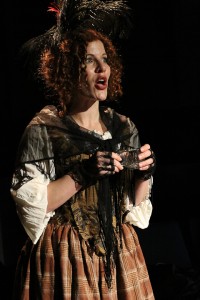By Bob Hicks
Today I posted Theater: Hard Times for big theories on Oregon ArtsWatch _ a little theorizing on the failure of theories, as expressed by Voltaire in Candide (as adapted in the Leonard Bernstein musical at Portland Opera) and Charles Dickens in Hard Times (as adapted by playwright Stephen Jeffreys and performed at CoHo Theatre).
 The grand theorizers tried by their creators and found wanting are the libertine Dr. Pangloss in Candide and the earnest schoolmaster Thomas Gradgrind in Hard Times. You might find their viewpoints familiar.
The grand theorizers tried by their creators and found wanting are the libertine Dr. Pangloss in Candide and the earnest schoolmaster Thomas Gradgrind in Hard Times. You might find their viewpoints familiar.
A couple of excerpts:
*
“You can’t walk around the art world, let alone the culture at large, without bumping into a theory or twelve. Essential to science, where they’re part of a continuing process of discovery, they tend to harden into dogma in the cultural, political and religious realms. In art circles people sometimes forget that theories work best when they explain what’s happening in art, not when they try to drive how it’s being made. And when applied rigorously to something as unpredictable and emotional as human beings, theories can create havoc. Ask B.F. Skinner’s kids. Ask Dickens and Voltaire.”
*
“Gradgrind may be something of a fool, but he’s no Pangloss, adopting a handy theory as an excuse for libertinism. Gradgrind’s public-spirited and wants to be generous: he just gets it wrong. He begins with the Utilitarian tenet that society’s main goal is “the greatest amount of happiness for the greatest amount of people,“ a not unreasonable response to the industrial revolution that created a few big winners and a multitude of losers (sound familiar?) as it wrenched Europe away from its agrarian roots, and extends it to a belief that reason, and reason alone, will improve the average person’s lot.”
Inset: Camille Cettina in “Hard Times.” Photo: Gary Norman.